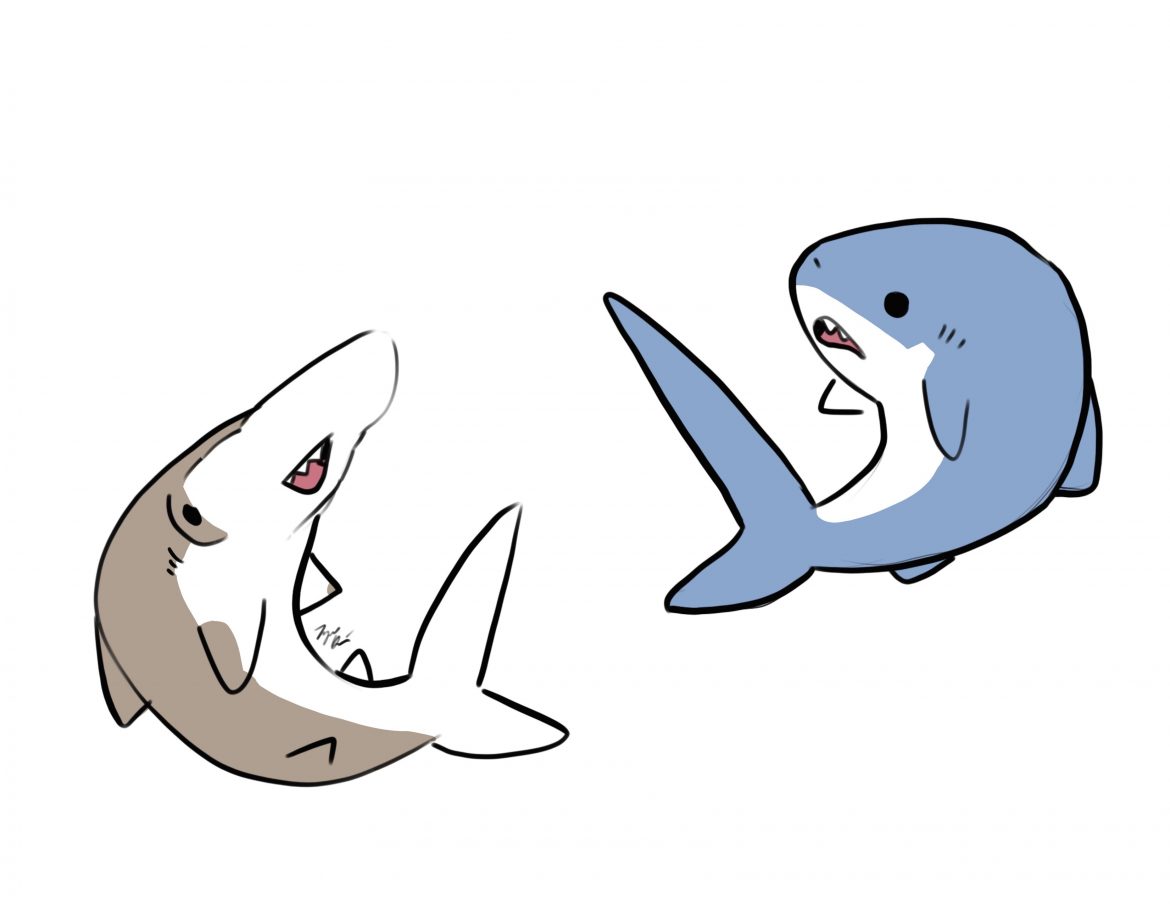Illustration Credit: Joyce Qiu, Illustration Editor
Reasons why you should reconsider your fear of sharks
Lucia Harley, Contributor
Over time, the general public’s opinion of sharks has been warped by the media, word of mouth, and misconception. News articles with their daunting headlines and drama-filled attack movies all make sharks the bad guys in their stories. But sharks are not the ill-mannered ocean villains we see in the media. In fact, they can be heroes. In comparison to other species and their harm to humans, sharks do almost no damage to mankind. Their ecological contributions far outweigh the dangers they pose to humans annually. They’ve been treated unfairly on many fronts, and the world’s perception of them has been twisted so that the public can’t see them for the sweet sea creatures they are.
In 2001, following an attack on a ten-year-old boy, headlines began appearing in the media, such as “Killer Shark Strikes Again” and “Killer Shark Attack.” It was later discovered that the injuries, brought on by a very small species called the Blackfoot Shark, were incredibly minor. The news, which informs the general public’s opinion, is harmful to sharks when portraying them so viciously.
More fear mongering regarding sharks often comes from movies. The roles and traits given to sharks in films are typically evil. Although the plot or characters of a fictional story are important, it’s more about what people take away from the movies. From childhood we are led to believe in the rude, harmful nature of sharks while watching movies like Finding Nemo and Shark Tale. This continues as we get older by watching movies like Jaws. Jaws is credited with promoting widespread fear of sharks within the public. For example, there was an observable decrease in public opinion of sharks after its release in 1975. The consequences were completely unintentional, but they were prominent. After the film’s release, people refused to go into the ocean and there were even reports of hired “shark hunters” in a few areas. The reaction was harmful to shark populations around the world. Yes, the film is a classic. However, people must remember that the fear they feel from the giant, fictional shark shouldn’t apply to the real live ones that are typically just minding their business in their habitats.
Speaking of minding their own business, sharks really do try to keep to themselves. If a shark attacks a human, it is almost never intentional. Only about 12 of the 300 existing shark species have been known to attack humans. When they did, it was simply out of confusion or curiosity. A shark may see a human swimming, maybe splashing in the water, and swim over to investigate. This has led to several accidental attacks which are hardly comparable to other statistics. For example, the average number of shark attacks per year is 72. The average number of deaths caused by hippos in Africa per year, in contrast, is a whopping 500. Not even attacks – deaths! Also, to look at something more personal to us at U of T, the raccoon population in Toronto should receive more of our attention than sharks. There was a 62% increase in raccoon attacks during the pandemic in Toronto. You are also far more likely to be killed by accidental poisoning, boating, fireworks, the flu, hunting, a ladder, a train crash, a tornado, or a lawnmower, than you are to be killed by a shark. We are far more deadly to them than they are to us.
This deadliness, I think, is the real danger. Sharks, while they are harmful, are killed far too often. They are incredibly important within their ecosystems. In fact, there is an exciting story emerging about a breed of shark wildly improving its ecosystem. A video, posted to TikTok by a man living by a small reef in the Caribbean, showed Lionfish causing damage to the reef habitat. As an invasive species from the Pacific Ocean, they were getting into the nurseries and killing the smaller fish in the reefs that are important to the ecosystem, eerily reminiscent of the shark attacking fish in the beginning of Finding Nemo. The Lionfish’s only potential predator is called a Nurse Shark. The sharks had been in the reef for an incredibly long amount of time and knew well what to hunt and not hunt. Residents, informed by biologists, began feeding the Lionfish to the Nurse Sharks. It didn’t work at first, but now the Nurse Sharks in the reef are slowly learning to hunt the harmful fish. Finally, a story has emerged where the shark is the hero!
Sharks are not the villains we see portrayed in the media. Typically minding their business, sometimes extremely peaceful, and just occasionally dangerously curious or confused – they do not deserve the terrible reputation they receive. Although a lot of what I’ve mentioned is not problematic in nature, it is important to dispel myths surrounding sharks as the general fear of the creatures puts them and their ecosystems at stake. We should start shifting our perspectives on sharks from fearful villains plotting an attack to somewhat misunderstood heroes of the ocean.




